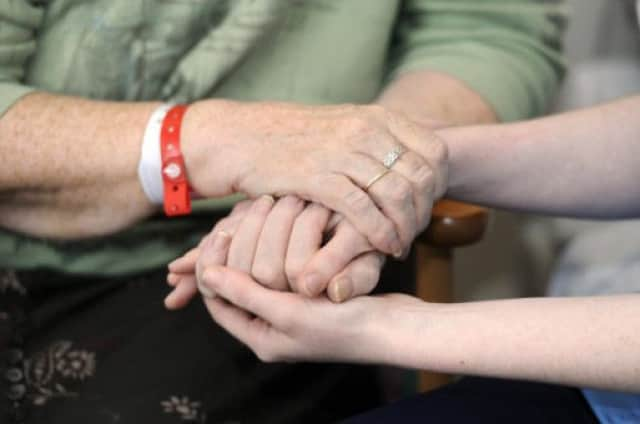Simple test could detect Alzheimer’s


The 15-minute self-test can indicate early signs of decline that may be the first indication of Alzheimer’s.
Results of the Self-Administered Gerocognitive Examination (Sage) test, a questionnaire, can be shared with doctors to help them detect early signs of dementia or Alzheimer’s.
Advertisement
Hide AdAdvertisement
Hide AdHowever, a leading UK Alzheimer’s charity gave a cautious response to the research, insisting people should still go to their doctor if they think they have memory problems.
The research team, from Ohio State University, asked 1,047 people to complete the simple questionnaire. The results, published in the Journal of Neuropsychiatry and Clinical Neurosciences, found that just over a quarter of them – 28 per cent – had cognitive impairment, a mild loss of mental functioning.
The results closely matched those from detailed tests.
The volunteers were tested on mental orientation, language, reasoning, three-dimensional construction, problem solving and memory abilities.
Dr Douglas Scharre, who helped develop the test, said: “What we found was that this Sage self-administered test correlated very well with detailed cognitive testing. If we catch this cognitive change really early, then we can start potential treatments much earlier.”
Treatment for Alzheimer’s is usually more effective when started in the earliest stage.
However, patients often wait as many as four years after their symptoms first appear to see their GP to seek medical treatment.
Dr Scharre said: “Hopefully, this test will help change those situations.”
While the Sage test cannot diagnose patients’ problems, it gives doctors a “baseline” of mental function so that progressive changes can be tracked over time and they can more easily detect problems.
Advertisement
Hide AdAdvertisement
Hide AdEarlier research led by Dr Scharre’s team reportedly found four out of five people with mild thinking and memory issues will be detected by their test and that 95 per cent of people without issues will have normal Sage scores.
Sample questions in the test include writing the names of 12 different animals or items found in a kitchen, drawing the face and numbers on a clock, identifying the date of the test, and describing the similarities between a bike and a train.
Participants were given their score and advised to show it to their doctors if they had got six or more questions out of 22 questions wrong.
Dementia affects around 82,000 people in the UK. It is estimated that one in three people aged over 65 will die with a form of dementia.
Latest estimates revealed dementia costs the UK economy around £23 billion a year, more than cancer and heart disease combined. Dr Simon Ridley, head of research at the charity Alzheimer’s Research UK, said: “Further research is needed to confirm whether the Sage test would be suitable to assess and track changes in people’s memory and thinking skills.
“One drawback of this study is that the test was not compared with other cognitive tests.
“It’s important to note that the test is not designed to diagnose dementia, and people who are worried about their memory should seek advice of a doctor rather than attempting self-diagnosis with a test at home.”
How double shot of caffeine can boost power of recall
A double espresso shot can help to jog those elusive memories, new research suggests.
Advertisement
Hide AdAdvertisement
Hide AdScientists have found the first clear evidence of caffeine’s memory-boosting effect, and shown it lasts at least 24 hours.
Volunteers took part in a trial in which they were either given a 200 milligramme caffeine pill or dummy placebo tablet five minutes after studying a series of images.
Tests a day later proved that the memory of those who took caffeine had been enhanced at a deep level. The amount of caffeine used was roughly equivalent to a double shot of strong espresso coffee.
Lead researcher Dr Michael Yassa, assistant professor of psychological and brain sciences at Johns Hopkins University in Baltimore, Maryland, said: “We’ve always known caffeine has cognitive-enhancing effects, but its particular effects on strengthening memories and making them resistant to forgetting has never been examined in detail in humans.
“We report for the first time a specific effect of caffeine on reducing forgetting over 24 hours.”
More than 100 participants took part in the study, none of whom were regular users of caffeinated products.
Before being given the caffeine pill or placebo, they were asked to identify a series of pictured objects as either outdoor or indoor items.
The next day, both groups were tested on their ability to recognise the images they had been shown earlier. Some of the images were the same as the ones they had seen, some were new, and some similar but not identical.
Advertisement
Hide AdAdvertisement
Hide AdAlthough all the volunteers correctly identified “new” and “old” pictures, those who had taken the caffeine pill were better able to distinguish “similar” images.
Participants not dosed with caffeine were more likely to be fooled into thinking the similar pictures were the ones viewed the previous day.
Recognising the difference between two similar but not identical items reflects a deep level of memory retention, said the team, writing in the journal Nature Neuroscience.
Until now, the few caffeine studies done have suggested it has little or no effect on long-term memory.
• Click herefor more test questions